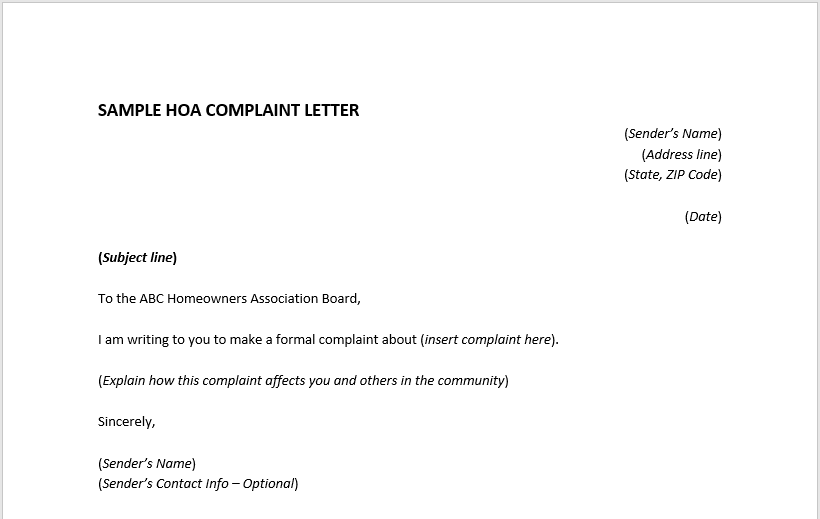As an HOA board member, you have probably dealt with difficult homeowners in the past. Knowing how to effectively handle HOA complaints from community members is an essential but often overlooked part of your responsibilities. It is impossible to completely resolve every complaint that arises. After all, you can’t please everybody. But if you stick to the right process, a resolution will usually follow.
How to Handle HOA Complaints Like a Pro
No one likes being on the receiving end of complaints. They can be fairly negative and can even bring down your mood. However, they are a natural part of any homeowners association. Not everyone has the same opinion, and you can’t expect the whole community to love the way things are currently run. Everyone has a say of their own, whether you like it or not.
Although complaints are normal in an HOA, dealing with them can be a tall order. Not all board members are equipped to handle HOA complaints thrown their way. When you’re in a position of leadership, though, you must learn.
As an HOA board member, it is part of your job to resolve conflicts and listen to complaints. More than that, you have a responsibility to handle them the right way. After all, the slightest mistake could land you in hot water with not just the HOA but with the law, as well.
Let’s take a look at the proper way to handle homeowners’ complaints below:
Step 1: Understand and Acknowledge
 When faced with a difficult situation, a person’s first instinct usually involves a big reaction — typically a negative one.
When faced with a difficult situation, a person’s first instinct usually involves a big reaction — typically a negative one.
As a board member, when a resident approaches you with a complaint, you must fight your tendency to react badly. Don’t dismiss the complaint or tease the resident for “being too nitpicky.”
Although not all complaints make total sense, homeowners do have a right to voice their opinions. Moreover, it would be unfair for you to generalize that all homeowners complain simply because they want to.
That’s a dangerous assumption that could easily lead to apathy or, worse, derision. Instead, you should assume that residents complain because they genuinely care about the community.
If a resident gives you a complaint, whatever it may be, thank them for their input and assure them that they have been heard. Sometimes, all they need is for you to lend them an ear. Acknowledge their concerns but promise nothing, even if your heart tells you otherwise.
Practice this way of responding to complaints as often as possible. While it is easy to fall back on old habits, you must always remember that your actions define you.
Step 2: Check the Law
After a homeowner submits their complaint, it is time to work towards a resolution. First, research any federal or state law that may be related to the homeowner’s complaint. You may not even need to go any further if the law already has a solution. Of course, the law can sometimes be too vague or general. Whether you encounter any problems or not, it is best to consult with your association’s attorney for safety.
Step 3: Check Your Governing Documents
 If the law does not dictate how you can handle HOA complaints, the next step is to look into your association’s governing documents. After learning of complaints against HOA rules or members, check your bylaws and CC&Rs for any related provisions.
If the law does not dictate how you can handle HOA complaints, the next step is to look into your association’s governing documents. After learning of complaints against HOA rules or members, check your bylaws and CC&Rs for any related provisions.
For example, if a resident complains about a neighbor’s loud music blasting at 10 in the evening, refer to your governing documents for rules regarding loud music.
Step 4: Discuss with the Board and HOA Manager
Sometimes, checking the law and your governing documents fails to turn up any solution. Other times, your HOA’s rules are too vague. In any case, you must then discuss the complaint with the HOA board and HOA manager. Examine the situation, as well as the parties involved, and talk about how you can come up with a win-win resolution.
Take note, though. You won’t always be lucky enough to arrive at a decision where all parties are satisfied. Sometimes, the most sensible solution may not even work in the complainant’s favor.
Step 5: Communicate the Resolution
 After deliberating with the board and HOA manager, it is now time to deliver the news to the complainant. Depending on the final decision, this portion will either be a breeze or be a total nightmare.
After deliberating with the board and HOA manager, it is now time to deliver the news to the complainant. Depending on the final decision, this portion will either be a breeze or be a total nightmare.
If you arrive at a resolution the complainant rejects, it may even bring up more bad blood. That’s unfortunately just part of the job description.
When you communicate the resolution, make sure to come from a place of empathy. Again, recognize their feelings and try not to rile them up. Explain how and why you have arrived at this decision. Let them know the board only wants what is best for the community. Be transparent, and most of all, don’t put the blame on anyone.
Tips When Dealing With Homeowners’ Complaints
In addition to the step-by-step guide on how to handle HOA complaints, here are some tips that can further help you:
1. Have Complaints Submitted in Writing
If owners strongly believe in their complaint, they should put it in writing and, at the very least, identify themselves. Asking them to submit an HOA complaint letter is ideal because it allows you to have a hard copy of the complaint. Furthermore, it gives you the ability to follow up and gather more information if necessary. Have a clear protocol on how to file a complaint against HOA community members.
Some homeowners may be concerned about revealing their identity. In this case, what you have to do is explain why you need their name and information. Assure them that you will keep their identity and information confidential if the situation allows it.
Come up with a format for your HOA complaint letter for your members to follow. If you don’t have one yet, refer to the sample below. We’ll even let you download it after this image.

2. Consider Informal Collection
There are HOAs, of course, that simply don’t have the time to sort through homeowners association complaint letters. In this case, consider collecting them informally. Many board members receive them through a town hall community meeting. Others take things a step further and set up a community “complaint box.” Alternatively, you can provide an email box that will receive complaints.
Another option is to set up a committee with board members who are ready to hear homeowner complaints. There is no one way of receiving disputes and complaints, but make sure that your method works with the schedule and abilities of your board members, especially if you don’t have a community manager.
3. Use Your HOA Management Company to Your Advantage
If you have an HOA or community manager, direct all disputes and complaints to them. The manager should be trained in conflict resolution, be able to effectively resolve heated situations, and know how to handle HOA complaints with relative ease.
Some complaints will be rather easy to resolve and verify, but others will be more difficult to deal with. If they can not be verified easily, the community manager should still investigate the situation and explain the resolution process to the homeowner in question.
4. Give Your Manager Power (But Not Too Much)
 As a board member, you need to meet with your community manager and learn more about their company or organization.
As a board member, you need to meet with your community manager and learn more about their company or organization.
If the company has a customer service department that deals with homeowner complaints, do not give them too much power to handle these disputes.
If you grant your community manager a fair amount of power to resolve homeowners’ complaints, make sure that they have the necessary knowledge of your association’s rules and regulations.
If they don’t have this knowledge, they will not be able to give good advice to homeowners and resolve disputes. They will likely give terrible advice and only make these disputes worse.
4. Understand When the Board Needs to Act on a Complaint
If there is not enough information to resolve a complaint right away, additional investigation will be necessary, and the board should consider taking action as well. It should be placed as an item on the board meeting agenda within a certain amount of time — ideally within 90 days — depending on the severity of the complaint. While you are waiting for the complaint to be addressed at the board meeting, keep in contact with the complainant.
If the complaint is about another homeowner or a vendor, speak with these individuals to gather more information. After this, the dispute should be handled by the board of directors, and the complainant should have the opportunity to testify on his or her behalf.
Expertly Handle HOA Complaints Moving Forward
Some people are naturally born with the gift of conflict resolution, while others have to work at it. Let this guide and set of tips help you handle HOA complaints from here on out. Not all complaints are made equal, though, so it may take some time to adjust to each new one every time a resident complains.
Most community associations elect to hire an HOA management company to handle HOA complaints. Management companies make dealing with complaints a much easier process. If you’re currently not working with one, keep us in mind.
RELATED ARTICLES:
- Dealing With Difficult Residents: Diffusing Anger In Your Community
- HOA Board Members Harassment: What’s The Right Thing To Do?
- How Should The HOA Deal With Neighbor Harassment






